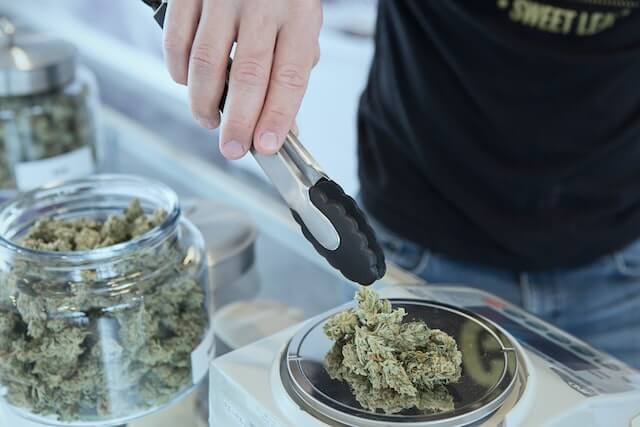Use Your Skills to Get a Job in the Cannabis Industry

Looking to get a job in the fast-growing cannabis industry? With the legalization of cannabis in many states and countries, there has been a surge in demand for products and services, leading to an increase in the need for skilled workers to fill various positions. The cannabis industry offers diverse career opportunities beyond just growing and selling cannabis, including areas such as research, marketing, sales, and more.
For individuals looking for a career change or seeking employment opportunities, the cannabis industry offers an attractive option. The industry has been growing steadily, with a projected market value of $102.2 billion by 2030, according to Grand View Research. This growth provides ample opportunities for those looking for a stable and lucrative career path.
One of the significant advantages of the cannabis industry is its inclusivity of individuals from diverse backgrounds and skill sets. As the industry continues to grow, it requires a wide range of skills to meet the demands of consumers. Transferable skills, such as communication, problem-solving, and adaptability, are highly valued in the cannabis industry. These skills can be acquired through various professions, making it an accessible industry for individuals from different backgrounds.
In this blog post, we will discuss how individuals can use their transferable skills to secure a job in the cannabis industry. I will explore the importance of researching the industry, identifying transferable skills, tailoring resumes and cover letters, networking, and considering additional education and training. By the end of this article, you will have a clear understanding of how to leverage your skills and experience to break into this exciting and growing industry.

Research the Industry Before You Get a Job
The first step towards finding a job in the cannabis industry is to research the industry thoroughly. The cannabis industry is a fast-growing and ever-evolving industry, with numerous job opportunities available across various sectors. Therefore, it is crucial to have a good understanding of the industry, its regulations, and the different sectors that make up the industry.
The Importance of Researching the Cannabis Industry
Researching the cannabis industry is vital for anyone looking to break into the industry. It can help you understand the different sectors and job opportunities available, the skills required for each job, and the industry’s regulations. It can also help you identify industry trends and potential growth areas, which can be valuable when considering a career move.
Tips on Finding Relevant Information
To research the cannabis industry, it is essential to find relevant information about the industry.
Here are some tips on where to find such information:
- Industry Associations: There are many industry associations dedicated to the cannabis industry. These associations provide a wealth of information about the industry, including industry news, job postings, and events. Some of the most popular industry associations include the National Cannabis Industry Association (NCIA), the Marijuana Policy Project (MPP), and the Cannabis Business Alliance (CBA).
- Trade Shows: Attending cannabis trade shows can be an excellent way to learn about the industry and network with industry professionals. These events provide an opportunity to meet with industry leaders, learn about new products and services, and attend informative seminars and workshops.
- Online Resources: Many online resources provide information about the cannabis industry. These resources include online forums, blogs, and news sites. Some popular online resources include Marijuana Business Daily, Leafly, Weedmaps, CBD.how, and of course Mimea.
Understanding Local Laws and Regulations
Another important aspect of researching the cannabis industry is understanding the local laws and regulations around cannabis. The laws and regulations governing the cannabis industry vary from state to state and country to country. Therefore, it is crucial to understand the regulations in your area before pursuing a career in the industry.
In the United States, for example, cannabis is still illegal at the federal level, but many states have legalized cannabis for medicinal and/or recreational use. Each state has its own regulations around cannabis, which can include restrictions on the amount of cannabis that can be possessed, where cannabis can be consumed, and who can purchase and consume cannabis.
In Canada, cannabis is legal for both medicinal and recreational use, but there are still regulations around its use, possession, and sale. It is important to be aware of these regulations to avoid any legal issues when working in the industry.
Researching the cannabis industry is an essential step toward finding a job in the industry. It can help you understand the different sectors and job opportunities available, the skills required for each job, and the industry’s regulations. By using industry associations, attending trade shows, and utilizing online resources, you can stay up-to-date on industry trends and potential growth areas.
Additionally, understanding local laws and regulations around cannabis is crucial to avoid any legal issues when working in the industry. By doing your research, you can position yourself as a qualified and informed candidate when applying for jobs in the cannabis industry.

How to Identify Your Transferable Skills to Get a Job
To identify your transferable skills, you need to take a step back and assess your previous work experience. Think about the tasks you have performed, the challenges you have faced, and the skills you have developed. Transferable skills can be broadly categorized into hard skills and soft skills.
Hard skills are technical or specific skills related to a particular job or industry. For example, if you have experience in retail, you may have skills in customer service, sales, or inventory management.
Soft skills, on the other hand, are personal attributes that are transferable across different industries and jobs. For example, if you have strong communication or leadership skills, these skills can be applied to various positions in the cannabis industry.
Common Skills Valuable in the Cannabis Industry for You to Get a Job
Once you have identified your transferable skills, it’s important to understand how they can be applied in the cannabis industry. Here are some examples of common skills that are valuable in the industry:
- Sales: Sales skills are valuable in the cannabis industry, particularly for positions in dispensaries or sales representatives for cannabis companies.
- Marketing: Marketing skills are essential for businesses in the cannabis industry to establish their brand, reach their target audience, and differentiate themselves from competitors.
- Customer Service: Customer service skills are necessary for those who work in dispensaries or other cannabis-related businesses where customer interactions are frequent.
- Project Management: The cannabis industry is growing rapidly, and project management skills are critical for managing projects, setting goals, and keeping track of progress.
- Data Analysis: Data analysis skills are valuable in the cannabis industry, particularly in research and development, product development, and marketing.
Consider Skills That May Not Seem Directly Related
It’s important to recognize that skills that may not seem directly related to the cannabis industry can still be valuable. For example, skills in project management, data analysis, or logistics can be applied to various positions in the industry, such as operations or supply chain management.
It’s also important to consider skills that may not be specific to a particular job or industry. For example, if you have experience in leadership or problem-solving, these skills can be transferable to many different positions in the cannabis industry.
Identifying your transferable skills and understanding how they can be applied in the cannabis industry is crucial in making a successful career transition. By assessing your previous work experience and recognizing your transferable skills, you can position yourself as a qualified candidate for positions in the industry.
Additionally, it’s important to consider skills that may not seem directly related to the cannabis industry, as they can still be valuable in various positions. By leveraging your transferable skills, you can make a smooth transition into the cannabis industry and find a fulfilling career path.

Importance of Tailoring Your Resume and Cover Letter
Tailoring your resume and cover letter is important for several reasons. Firstly, it allows you to showcase your transferable skills and experience in a way that is relevant to the cannabis industry.
Secondly, it shows that you have put effort and research into understanding the industry, which can make you a more attractive candidate to potential employers. Finally, it helps to ensure that your resume and cover letter stand out from other applicants and make a positive impression on recruiters.
Tips for Highlighting Transferable Skills and Relevant Experience
When tailoring your resume and cover letter for the cannabis industry, it’s important to highlight your transferable skills and any relevant experience. Here are some tips for doing so effectively:
Use bullet points to highlight your transferable skills and how they can be applied in the cannabis industry. For example, if you have experience in sales, you can highlight your ability to communicate effectively with customers and meet sales targets.
Use specific examples to demonstrate your relevant experience. For example, if you have experience in marketing, you can highlight a successful marketing campaign that you were involved in and how you contributed to its success.
Focus on achievements and results rather than just listing your job duties. This shows that you are results-driven and can add value to the company.
Use action verbs to describe your skills and experience, such as “managed,” “created,” or “collaborated.” This helps to make your resume and cover letter more dynamic and engaging.
Importance of Using Industry-Specific Language and Terminology
Using industry-specific language and terminology is important in demonstrating your knowledge and understanding of the cannabis industry. It also helps to establish credibility with potential employers and shows that you are serious about pursuing a career in the industry. Here are some examples of industry-specific language and terminology to use:
- Cannabinoids: These are the active compounds in cannabis that have various therapeutic properties.
- Terpenes: These are the aromatic compounds in cannabis that give it its unique flavor and smell.
- Dispensary: This is a retail store that sells cannabis products to consumers.
- Cultivation: This is the process of growing cannabis plants.
- Extracts: These are concentrated forms of cannabis that are used in various products, such as edibles or topicals.
Tailoring your resume and cover letter is an important step in finding a job in the cannabis industry. By highlighting your transferable skills and relevant experience, using industry-specific language and terminology, and focusing on achievements and results, you can position yourself as a strong candidate for positions in the industry. Taking the time to tailor your application materials shows that you are serious about pursuing a career in the cannabis industry and can make a positive impression on potential employers.

Importance of Networking in the Cannabis Industry
Networking is critical in the cannabis industry for several reasons. Firstly, the industry is still in its infancy, and many jobs may not be advertised publicly. Building connections can help you tap into the hidden job market and gain access to opportunities that might not be available otherwise.
Secondly, the cannabis industry is highly regulated, and relationships with key industry players can help you navigate the complexities of local and state regulations. Finally, the industry is highly collaborative, and building relationships can help you learn about new trends, innovations, and best practices.
Tips for Networking Effectively
Attend Industry Events: Attending industry events such as conferences, trade shows, and networking events can be an excellent way to connect with people in the cannabis industry. These events are a great opportunity to meet new people, exchange ideas, and learn about new developments in the industry.
Join Industry Associations: Joining industry associations such as the National Cannabis Industry Association (NCIA) or the Marijuana Business Association (MJBA) can be an effective way to connect with other professionals in the industry. These associations offer networking opportunities, educational resources, and advocacy for the industry.
Connect on LinkedIn: LinkedIn is a powerful tool for networking in any industry, including the cannabis industry. Connecting with people in the industry can help you build relationships, gain insight into the industry, and stay up to date on job opportunities.
Consider Informational Interviews: Informational interviews are an excellent way to learn about different careers in the cannabis industry and gain insights from people already working in the field. Reach out to people in the industry and ask if they would be willing to talk to you about their career path, job responsibilities, and the industry in general.
Importance of Building Relationships
Building relationships is a critical aspect of networking in the cannabis industry. In a highly collaborative industry, having strong relationships with key industry players can help you access new opportunities, learn about new trends, and gain valuable insight into the industry.
It’s important to approach networking with a long-term perspective and focus on building genuine relationships rather than just looking for job opportunities. Building strong relationships can take time, but it can pay off in the long run, both professionally and personally.
Networking is a crucial component of finding a job in the cannabis industry. Attending industry events, joining industry associations, connecting with people on LinkedIn, and considering informational interviews can help you build connections and gain valuable insight into the industry.
It’s important to approach networking with a long-term perspective, focus on building genuine relationships and be patient. By following these tips, you can increase your chances of landing a job in the cannabis industry and building a successful career.

Importance of Additional Education or Training
The cannabis industry is evolving rapidly, and staying up-to-date with the latest industry developments and regulations is critical for success. Additional education or training can help you gain the knowledge and skills needed to excel in the industry.
Furthermore, many jobs in the cannabis industry require specialized skills and knowledge, such as cannabis cultivation or budtender certification. Having these certifications can make you a more attractive candidate to potential employers and help you stand out from other applicants.
Examples of Relevant Education and Training Programs
Cannabis Cultivation: With the growing demand for high-quality cannabis products, there is a need for professionals with knowledge and skills in cannabis cultivation. Many colleges and universities now offer courses or programs in cannabis cultivation, covering topics such as plant physiology, pest management, and harvest techniques.
Budtender Certification: Budtenders are the frontline workers in the cannabis industry, responsible for educating customers and helping them choose the right products. Many organizations offer budtender certification programs, which cover topics such as cannabis strains, dosage, and consumption methods.
Regulatory Compliance: Given the complex and rapidly evolving nature of cannabis regulations, there is a growing demand for professionals with knowledge and expertise in regulatory compliance. Many organizations offer training programs or certifications in cannabis regulatory compliance, covering topics such as state and local regulations, licensing, and compliance procedures.
Staying Up-to-Date with Industry Developments to Get a Job
Staying up-to-date with the latest industry developments and trends is essential in the cannabis industry. With new products, regulations, and innovations emerging all the time, it’s critical to stay informed and adapt to changing circumstances.
Attending industry events, such as conferences and trade shows, can be an excellent way to stay informed about the latest industry developments. Additionally, staying connected with industry associations and following industry publications can help you stay up-to-date on new products, regulations, and best practices.
Additional education or training can improve your job prospects and set you apart from other applicants in the cannabis industry. Cannabis cultivation, budtender certification, and regulatory compliance are just a few examples of relevant education and training programs.
Staying up-to-date with industry developments and regulations is critical for success in the industry. By investing in additional education or training and staying informed about the latest industry developments, you can increase your chances of success in the cannabis industry.

How to Apply and Prepare for Jobs in the Cannabis Industry
Once you have identified job opportunities in the cannabis industry and prepared your resume and cover letter, it’s time to apply and prepare for interviews. This section will discuss how to apply for jobs in the industry and provide tips on how to prepare for job interviews.
The cannabis industry is growing rapidly, and there are many job opportunities available. There are several ways to find job postings in the industry, including:
Online Job Boards: There are several online job boards dedicated to cannabis industry jobs, such as Indeed, Monster, and Leafly.
Company Websites: Many cannabis companies post job openings on their websites. It’s a good idea to check the websites of companies that you are interested in working for regularly.
Industry Associations: Industry associations, such as the National Cannabis Industry Association, often have job boards on their websites where companies can post job openings.
When applying for jobs in the cannabis industry, it’s important to tailor your application materials to the specific job you are applying for. Be sure to highlight your transferable skills and any relevant experience in your resume and cover letter.
How to Prepare for Job Interviews
Preparing for job interviews in the cannabis industry is similar to preparing for interviews in any other industry. Here are some tips to help you prepare:
Research the Company: Before your interview, research the company and the products or services they offer. Be sure to familiarize yourself with the company’s mission and values.
Practice Common Interview Questions: Practicing common interview questions can help you feel more confident during the interview. Be prepared to talk about your experience and how it relates to the job you are applying for.
Dress Professionally: Even though the cannabis industry is often more relaxed than other industries, it’s still important to dress professionally for your interview. A good rule of thumb is to dress one level above what you would wear on the job.
Be Enthusiastic: The cannabis industry is an exciting and rapidly growing industry, and it’s important to show enthusiasm for the industry and the job you are applying for. Show that you are passionate about the industry and the products or services the company offers.
Being Professional for your Job Interview
When applying for jobs and preparing for interviews in the cannabis industry, it’s important to be professional. While the cannabis industry is often more relaxed than other industries, it’s still important to be professional in your communications and interactions with potential employers.
Be sure to proofread your application materials for spelling and grammar errors, and always follow up after an interview to thank the interviewer for their time. Additionally, be respectful of any local laws and regulations around cannabis, and remember that you are representing yourself as a potential employee in the industry.
Applying for jobs and preparing for interviews in the cannabis industry requires similar strategies as any other industry. Researching the company, practicing common interview questions, and dressing professionally are all important in preparing for job interviews. It’s also important to be enthusiastic and professional in your communications and interactions with potential employers.
By following these tips, you can increase your chances of success in the cannabis industry.
In Conclusion
Using transferable skills to pursue a career in the cannabis industry can be a rewarding and exciting experience for many individuals. By researching the industry, identifying transferable skills, tailoring resumes and cover letters, networking effectively, considering additional education or training, and preparing for interviews, job seekers can increase their chances of success in the industry.
It’s important to remember that the cannabis industry is still relatively new and evolving, so staying up-to-date with industry developments and regulations is crucial. By following the tips outlined in this article and remaining enthusiastic about the industry, job seekers can find success and fulfillment in the growing world of cannabis.
Additional resources for those interested in pursuing a job in the cannabis industry include industry associations like the National Cannabis Industry Association and the Cannabis Business Alliance, job boards like Leafly and Indeed, and educational programs like those offered by Oaksterdam University and the Cannabis Training University.
With transferable skills and a passion for the industry, individuals can find meaningful and fulfilling careers in the cannabis industry.






Responses